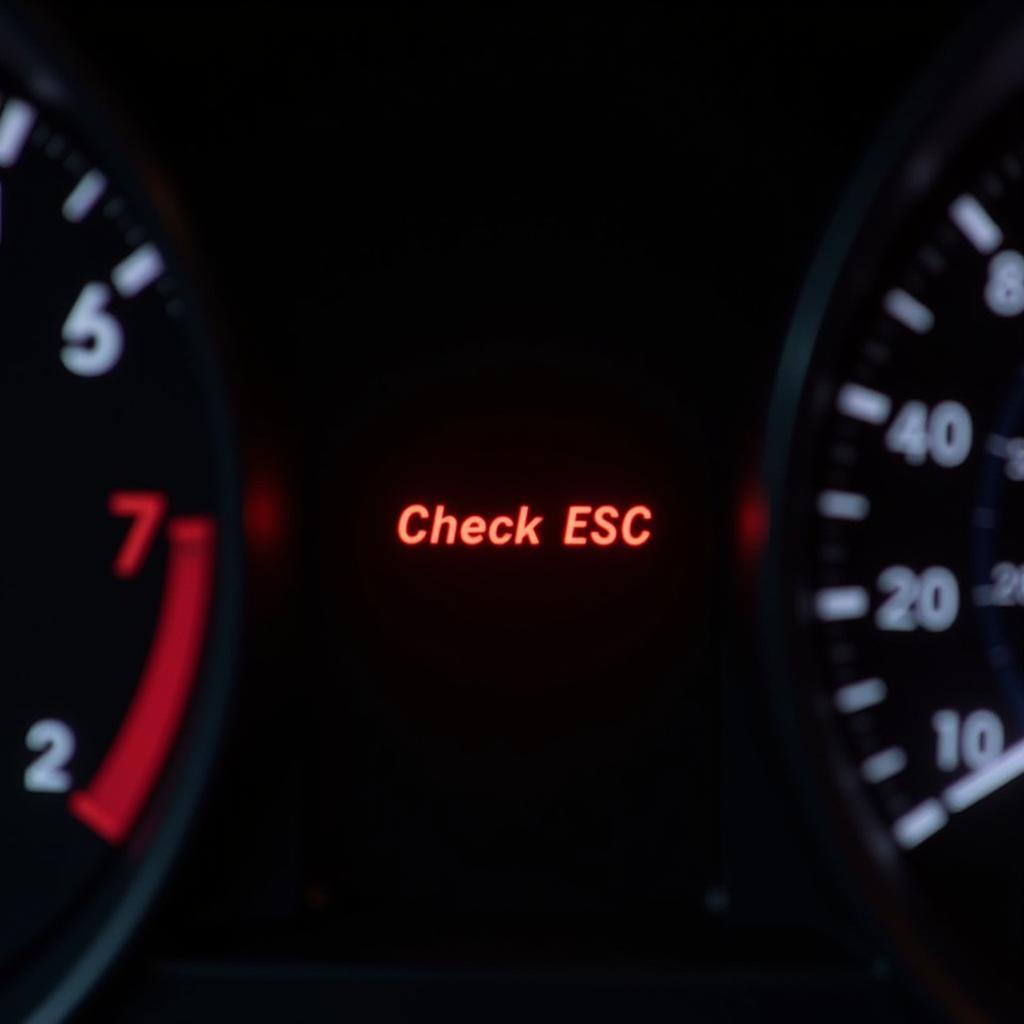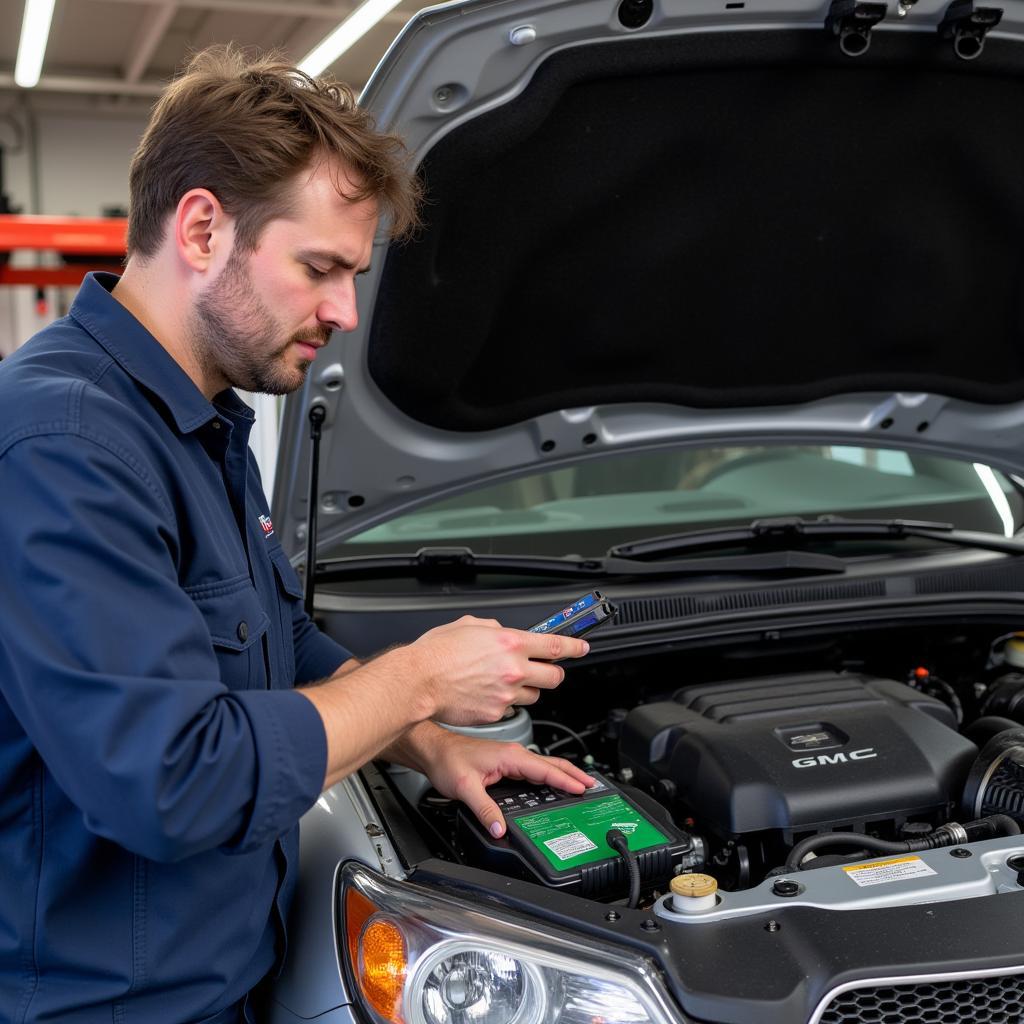If your Hyundai car displays a “Check ESC” warning and refuses to start, you’re not alone. This frustrating issue can stem from various problems, from a simple loose gas cap to more complex electrical faults. This guide will walk you through common causes and provide practical solutions to get your Hyundai back on the road.
Understanding the Check ESC Light and Starting Problems
The Electronic Stability Control (ESC) system is a crucial safety feature in modern vehicles like your Hyundai. It helps maintain control during slippery conditions by selectively applying brakes and reducing engine power. A “Check ESC” light illuminating on your dashboard signals a potential issue within this system. While the ESC system itself might not directly prevent the car from starting, its activation can sometimes indicate underlying problems that do. Let’s explore some of the most common culprits behind a Hyundai displaying “Check ESC” and experiencing starting difficulties.
Common Causes of “Check ESC” and No-Start in Hyundai Cars
- Dead Battery: This is often the most overlooked reason. A weak or dead battery can trigger various warning lights, including the “Check ESC,” and obviously prevent the car from starting.
- Faulty Alternator: If your alternator isn’t charging the battery properly, you might see the “Check ESC” light and experience starting issues.
- Brake Light Switch Issues: A malfunctioning brake light switch can confuse the car’s computer, affecting the ESC system and potentially the starting process.
- Steering Angle Sensor Problems: A faulty steering angle sensor can disrupt the ESC system’s calculations, leading to the warning light and potentially affecting other systems related to starting.
- Wiring Problems: Loose or corroded wiring connected to the ESC system or other critical components can cause a range of issues, including the “Check ESC” light and no-start condition.
- Fuel System Problems: While less directly related to the “Check ESC” light, a clogged fuel filter, faulty fuel pump, or even a loose gas cap can prevent the engine from starting.
 Hyundai Dashboard Showing Check ESC Warning Light
Hyundai Dashboard Showing Check ESC Warning Light
Troubleshooting Steps: How to Fix Check ESC Hyundai Car Not Starting
Here’s a step-by-step guide to help you diagnose and potentially fix the issue:
-
Check the Battery: Start with the basics. Test your battery voltage using a multimeter. If it’s low, try jump-starting the car. If the car starts, you might need a new battery.
-
Inspect the Alternator: If the battery tests fine, the alternator might be the culprit. Have it tested by a mechanic to ensure it’s charging correctly.
-
Examine the Brake Light Switch: Check if your brake lights are working correctly. If not, the brake light switch might be faulty and needs replacement.
-
Inspect Wiring and Connections: Look for any loose, corroded, or damaged wiring related to the ESC system and other crucial components. Repair or replace any damaged wiring.
-
Check the Fuel System: Ensure your gas cap is tightly secured. If the problem persists, have a mechanic inspect the fuel pump and filter.
-
Scan for Diagnostic Trouble Codes (DTCs): Use an OBD-II scanner to retrieve any stored trouble codes. These codes can pinpoint the specific problem area, making diagnosis much easier. Many auto parts stores offer free code scanning.
What if none of these steps work?
If you’ve tried these steps and your Hyundai still won’t start, it’s time to call in the professionals. A qualified Hyundai technician can perform a more in-depth diagnosis and identify any complex electrical or mechanical issues.
Expert Insights
“Often, the ‘Check ESC’ light combined with a no-start condition points towards a failing alternator or a weak battery,” says John Miller, a certified automotive technician with over 20 years of experience. “However, it’s crucial to perform a thorough diagnostic check to rule out other potential issues.”
“Don’t underestimate the importance of regular maintenance,” adds Sarah Johnson, an electrical systems specialist. “Keeping your battery connections clean and ensuring your alternator is functioning correctly can prevent many starting problems.”
Conclusion
Dealing with a “How To Fix Check Esc Hyundai Car Not Starting” situation can be stressful, but by following these steps, you can often pinpoint the cause and get your car running again. Remember, safety first. If you’re unsure about any step, consult a qualified mechanic. Need further assistance? Contact us at AutoTipPro at +1 (641) 206-8880. Our office is located at 500 N St Mary’s St, San Antonio, TX 78205, United States.
FAQ
- Can I drive my Hyundai with the “Check ESC” light on? While you might be able to drive, it’s not recommended. The ESC system is crucial for safety, especially in challenging conditions.
- How much does it cost to fix a “Check ESC” issue? The cost depends on the underlying problem. A simple fix like a new battery might be relatively inexpensive, while more complex electrical repairs can be more costly.
- Will a code scanner tell me exactly what’s wrong? While a code scanner provides valuable clues, it doesn’t always pinpoint the exact cause. Further diagnosis might be needed.
- Can a loose gas cap trigger the “Check ESC” light? In some cases, a loose gas cap can trigger various warning lights, including the “Check ESC” light.
- How can I prevent “Check ESC” and starting problems in the future? Regular maintenance, including battery checks and alternator inspections, can help prevent these issues.
- Is the “Check ESC” light related to the check engine light? While both lights indicate potential issues, they pertain to different systems. The “Check ESC” light refers to the Electronic Stability Control, while the check engine light relates to the engine’s performance and emissions.
- Can extreme temperatures affect the ESC system? Yes, extreme temperatures can impact battery performance and potentially affect the ESC system’s operation.





Leave a Reply